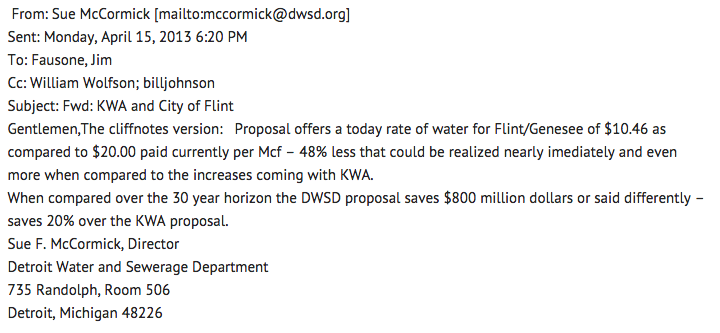As tens of thousands of Flint, Michigan, residents remain without drinkable tap water and are wondering if their children will face lifelong damage from lead exposure, new documents released in recent days cast significant doubts on the narrative embraced by Gov. Rick Synder’s (R) administration regarding how and why the city’s water supply was replaced by corrosive Flint River water to begin with.
In 2011, Snyder ordered a state takeover of Flint’s government amid the city’s mounting financial woes. During its time in receivership, a series of Snyder appointees served as “emergency managers,” overseeing Flint’s government functions and finding ways to cut spending.
Two years later, one of those managers, Darnell Earley, implemented a plan to switch Flint’s water supply from the Detroit system to a new consortium and to use water from the Flint River in the interim. He claimed this would save $6 to $8 million, one city council member recalled to the Associated Press. The Flint River water proved toxic and Snyder has said it will require a “long-term,” decades-long financial commitment to attempt to mitigate the damage to Flint children who drank the water.
But an email obtained by the Bill Johnson group and first reported by Motor City Muckraker suggests that the move might not have been necessary to reduce Flint’s water costs. Then-Detroit Water and Sewerage Department Director Sue McCormick proposed to continue providing water to Flint at a savings of $800 million over 30 years, or 20 percent less than the switch. In other words, Flint could have kept the Detroit water and still saved more money than it did. A spokeswoman for McCormick confirmed the email and reporting to ThinkProgress on Monday.

In a statement, McCormick explained that the Detroit Water and Sewerage Department (DWSD) had “attempted to negotiate with Flint to continue to provide water service to the city.” The projected savings, she explained, “were due largely to three factors: 1. Flint’s move to a model contract that is currently used by all wholesale customers as opposed to its then current, but outdated contract established in 1965; 2. Changing the point of connection where Flint receives DWSD water, which reduces elevation and distance (both factors in determining cost); and 3. An agreement recognizing that should Flint invest and keep their existing water plant certified and operational as an appropriate system back-up source, the proposed costs recognized that DWSD would no longer include planning for redundancy in service, resulting in an offsetting credit.”
On Sunday, ACLU of Michigan investigative reporter Curt Guyette reported that a previous Snyder emergency manager had considered switching to the Flint River over the long-term in 2012 and rejected the idea after consulting with the state’s Department of Environmental Quality. In his story, Guyette noted that Snyder’s then-spokeswoman falsely claimed in October that his administration could not have made the decision to switch to the Flint River because Detroit’s water authority had decided to cut the city off — a claim debunked by a March 2014 letter from Earley turning down the option to continue getting its water from the Detroit system. Last year, Snyder appointed Earley to be emergency manager for the Detroit Public Schools.
Neither of these details were included in a timeline of events given by Snyder in his State of the State address last Tuesday. In that speech, Snyder took some responsibility for the lead poisoning crisis and promised to voluntarily release his 2014 and 2015 emails, which are not public under Michigan’s disclosure laws. That release, however, proved to be heavily redacted and apparently incomplete.
A class-action lawsuit filed by Flint residents alleges that both Snyder and the state government breached their contract to provide drinkable water and of violated the state’s Consumer Protection Act by saying it was safe. State Attorney General Bill Schuette (R) announced an “independent investigation” on Monday, though his office is also defending Snyder in the class action case.
A spokesman for Snyder did not immediately respond to a ThinkProgress inquiry about the revelations.
This story has been updated to include additional details on the proposed savings, provided by Sue McCormick.
